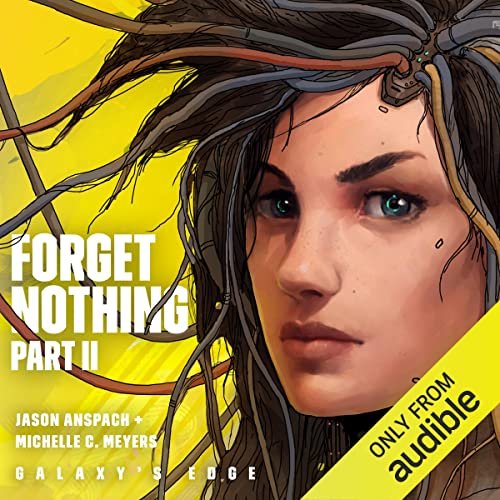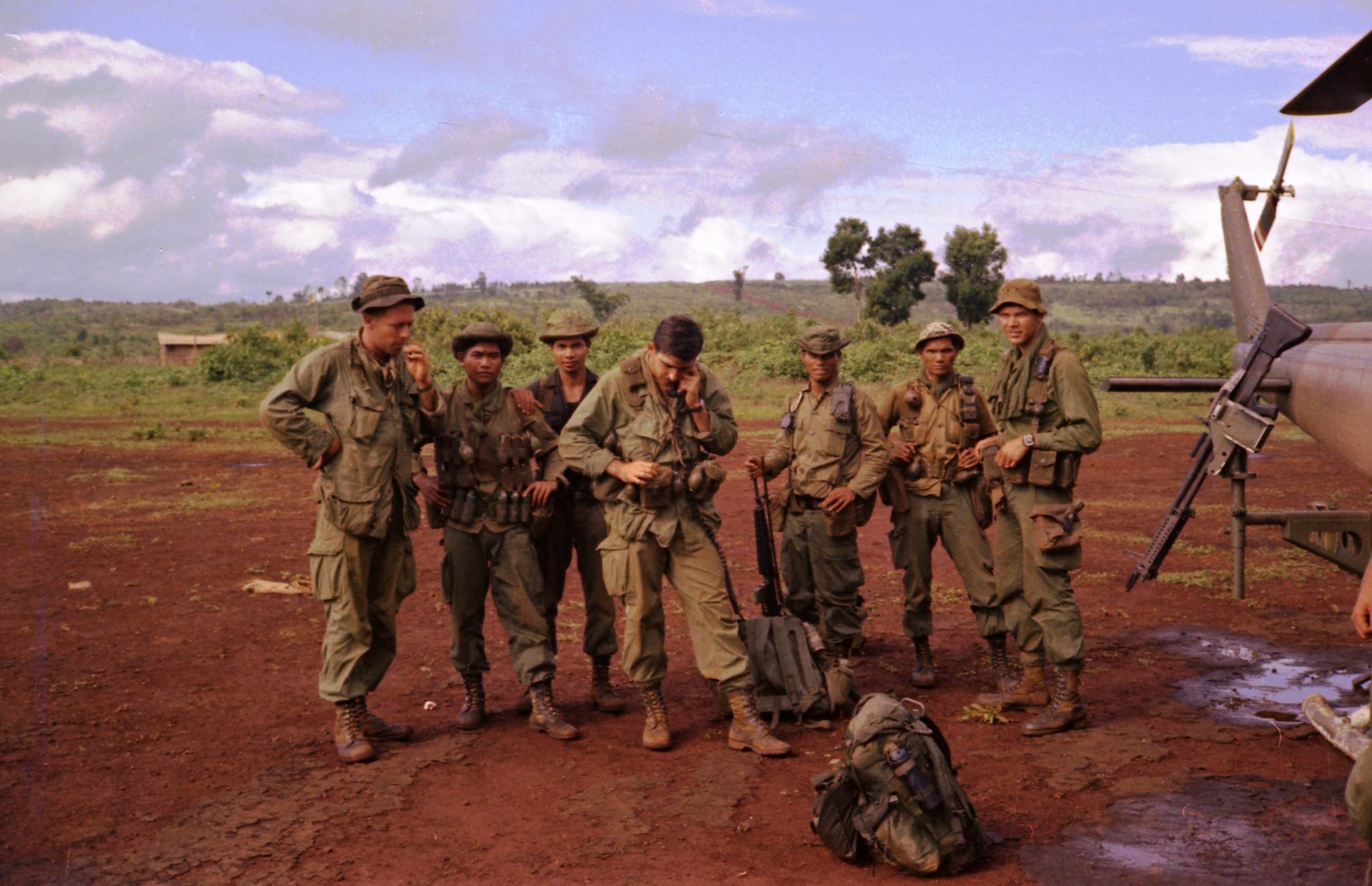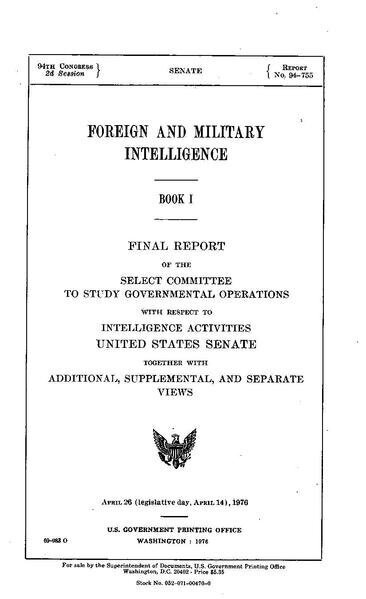Forget Nothing II Audiobook Review
Forget Nothing: Part II might seem like just another boot camp story. And on the surface, it is. But nothing at Galaxy’s Edge is as it first appears, and this story is no different.

Forget Nothing: Part II by Jason Anspach and Michelle C. Meyers performed by Khristine Hvam
This isn’t even the first time we have had a boot camp story in Galaxy’s Edge. The Legionnaires part of Gods & Legionnaires has that honor, coming first in publication order and in-universe as well. For many fans, the utterly brutal selection process Tyrus Rechs put his first Legionnaires through was a relief from the incomprehensible weirdness of the A. E. van Vogt-like look into the mind of a Savage that comprised the rest of the book. That brutality is recapitulated here, with Andien Broxin enduring much the same process 1,500 years later.
As an inside look at what that process does to your mind, I found Forget Nothing: Part II interesting. Shaping a person into a capable and trustworthy practitioner of instrumental violence is not pretty. As Andien learns, the Legion will turn you into something you do not want to be in order to fulfill its mission.
The strangeness in Forget Nothing: Part II is more subtle. The first layer is right out there for you to see. Start with the cover art. Devoted fans of the series who have already read Convergence will understand the reference, and indeed should have a pretty good idea where the book is going and how it ties into the rest of the story. I imagine there might be a few readers who come to Galaxy’s Edge through side books like these, so I won’t spoil it for those readers and listeners.
But let’s peel another layer, because that particular reveal isn’t even close to the most interesting thing in this book. In my review of Convergence, I said that essential context for interpreting these books is the generation-long Forever War in the Middle East. A major theme of Galaxy’s Edge is the simmering anger of the most disciplined and loyal and competent soldiers at the futility of the conduct of the Forever War and the accompanying waste of blood and treasure.
Something I didn’t get into in my review of Convergence is the contempt in which those loyal and competent soldiers hold the members of the intelligence community. This was most memorably illustrated by the character named “Deep State” Volman in the other major Cole and Anspach universe, Forgotten Ruin, but you can see this theme of anger and distrust and feelings of betrayal running through Galaxy’s Edge as well.
Not every character is as over-the-top repulsive as the polo-shirted political hack Volman. “Tom”, the deep cover operative you meet in Kill Team is a sympathetic villain, a loyal son of the Republic who was seduced into committing unspeakable atrocities for “the greater good”. This book is about the process by which good men [and women] are recruited to do those things.
Let me be clear that I am speculating about things I have not experienced. If I did know something, I would not talk about it. But if you look, there are things that can be seen, or more often, a pattern of things that are not seen.

MACV-SOG
The notion of staffing the CIA with former policemen instead of drunken fraternity brothers is misguided. Spies are not cops, just as cops are not soldiers. Spies, or at least the agents who control them, are essentially social workers: they keep track of disgruntled people and give them money to keep them cooperative. Cops can be taught to do this, of course, but there is no reason to think they would be especially good at it.
In the United States, the CIA in particular is notorious for recruiting via an old-boy network in the Ivy League schools. The caricature of Volman nails this background perfectly. This works pretty well for finding the kind of gentlemen adventurers from middling to high social class backgrounds that litter the history of espionage. In the mid-twentieth century, you could think of T. E. Lawrence, Carleton Coon, or Kim Philby as typical examples. Their background is good for the basic work of running a network of informants, or even some basic army cadre work like Lawrence and Coon did in World War II.
This process doesn’t work so well when you need an operator, those quietly competent servants of empire that come from nowheresvilles like Modesto, California. Sometimes, intelligence agencies work with established military forces, like MACV-SOG. But that means people who are ultimately loyal to another organization and lots of bureaucratic complications. The way to solve this is to field your own force funded and commanded from your own organization. So there are people who work for intelligence agencies that are not primarily grown up frat boys or desk jockeys, but hard men who break stuff and kill people.
In order to find those men, it makes sense to go looking in the places that produce them. But a problem is that soldiers are often straightforward and unsubtle men, motivated by duty, while spies have a tendency toward moral flexibility and find duplicity as natural as breathing. Now, you can filter those soldiers and look for those with a problem with authority or a willingness to break the rules. But that can have its own negative consequences, producing a persistent personnel problem of people who cannot quite distinguish self interest from the national interest.

So there is another path, the one you see in Forget Nothing: Part II. What you see here is a process of manipulation and seduction, an initiation that the new recruit probably isn’t really aware of until its too late. The process of hardening soldiers to use violence probably makes this other, related process easier, as a candidate for an elite military unit is subjected to unspeakable hardship, and has to learn to tolerate unfathomable things in order to master themselves sufficiently to use force unflinchingly no matter the circumstances.
The things that intelligence paramilitaries are asked to do are then cast as nothing but more of same, only freed from petty bureaucratic oversight. We can judge how true that is in part by looking at things that are no longer secret, but also by the reaction of those who might be recruited for such things, and reject the call.
This book, and the thread that runs through Galaxy’s Edge, is a reflection of something like a foreign body response, a reaction to something unwelcome from the outside.
Or perhaps you could also see the book as something like a vaccine, a presentation of a neutered version of a dangerous thing so that the recipient recognizes and is prepared to resist the real thing when it comes along. A vaccine intended to prevent its audience from becoming “Tom”.
I suspect how interesting this book is will depend on the reader or listener’s interest in these matters of internal military culture. Andien certainly overcomes many obstacles in the story, but a traditional adventure it is not.
You can listen to Forget Nothing: Part II in audiobook form from Audible, or buy it in ebook form direct from the publisher. I did not receive a review copy of this book, it was purchased from my own funds. I receive affiliate advertising revenue from Amazon links, but not from links to the Galaxy’s Edge store.
My other book reviews | Reading Log
Galaxy’s Edge season 1:
Legionnaire: Galaxy's Edge #1 Book Review
Galactic Outlaws: Galaxy's Edge #2 Book Review
Kill Team: Galaxy's Edge #3 Book Review
Attack of Shadows: Galaxy's Edge #4 Book Review
Sword of the Legion: Galaxy's Edge #5 Book Review
Tin Man: Galaxy's Edge Book Review
Prisoners of Darkness: Galaxy's Edge #6 Book Review
Imperator: Galaxy's Edge Book Review
Turning Point: Galaxy's Edge #7 Book Review
Message for the Dead: Galaxy's Edge #8 Book Review
Retribution: Galaxy’s Edge #9 Book Review
Galaxy’s Edge season 2:
Legacies: Galaxy’s Edge #11 Book Review
Dark Victory: Galaxy’s Edge #12 Book Review
Convergence: Galaxy’s Edge #13 Book Review
Tyrus Rechs: Contracts & Terminations:
Requiem for Medusa: Tyrus Rechs: Contracts & Terminations Book 1 Review
Takeover
Takeover: Part 1 Book Review
Takeover: Part 2 Book Review
Takeover: Part 3 Book Review
Takeover: Part 4 Book Review
Takeover Book Review [summary for the omnibus edition]
Order of the Centurion
Order of the Centurion #1 Book Review
Iron Wolves: Order of the Centurion #2 Book Review
Stryker’s War: Order of the Centurion #3 Book Review
Through the Nether: Order of the Centurion #4 Book Review
The Reservist: Order of the Centurion #5 Book Review
Savage Wars
Savage Wars: Savage Wars #1 Book Review
Gods & Legionnaires: Savage Wars #2 Book Review
The Hundred: Savage Wars #3 Book Review
Forget Nothing
Dark Operator
Forgotten Ruin
Forgotten Ruin Book Review
Hit & Fade: Forgotten Ruin Book 2 Book Review
Violence of Action: Forgotten Ruin Book 3 Book Review
Lay the Hate: Forgotten Ruin Book 4 Review
Book of Joe: Forgotten Ruin Book 5 Review



Comments ()